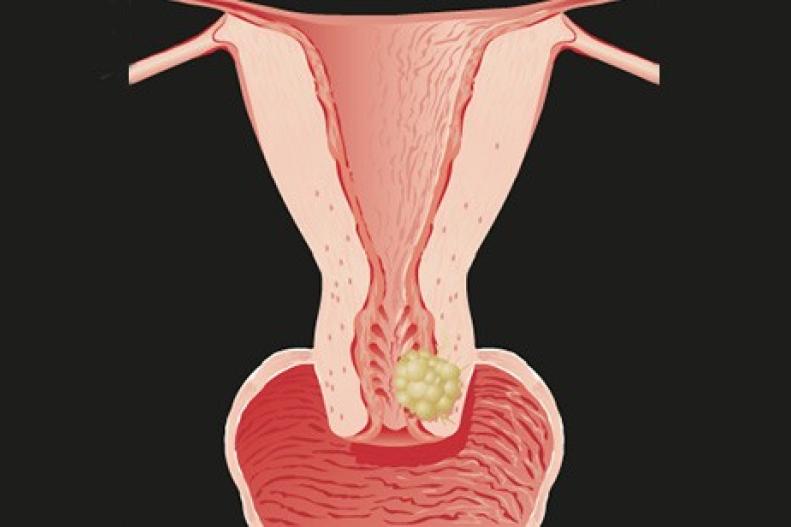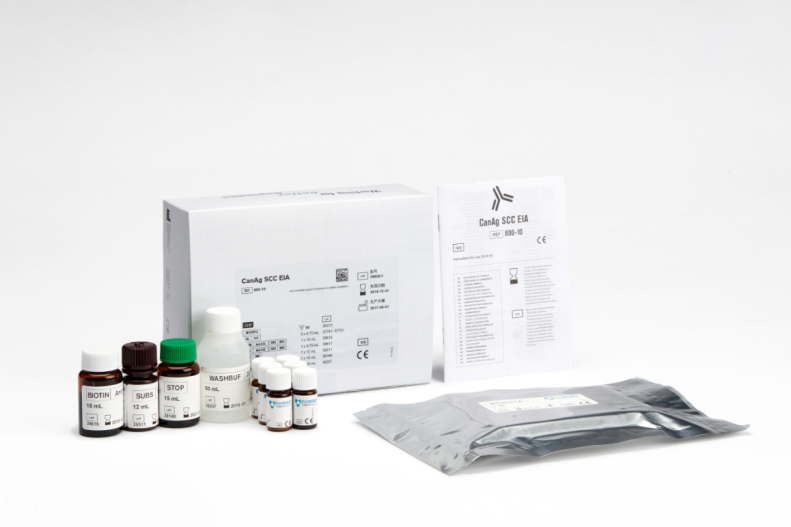CanAg® SCC EIA
Squamous cell carcinoma antigen (SCC ag) is a group of glycoproteins with molecular weight ~45 kDa, belonging to the family of serine/cysteineprotease inhibitors1. The protein was originally isolated by Kato and coworkers from human squamous cell carcinoma tissue and shown to consist of at least 10 subfractions differing in isoelectric point2. More recent studies have shown that SCC antigen is composed of two distinct but highly homologous gene products, SCCA1 and SCCA2 with different inhibitor specificities3.
SCC antigen is a serological marker of squamous cell carcinomas of the uterine cervix4, lung5, head & neck6, vulva7 and esophagus8. In squamous cell carcinoma of the uterine cervix, pretreatment serum SCC ag may be used as an early stage prognostic factor9 and the use of pretreatment SCC ag has been suggested in order to select high-risk patients for adjuvant therapy4. Further, for patients with elevated levels of SCC ag before start of treatment, the profile of SCC ag correlates with the response to radio- and chemotherapy and measurement of SCC ag may thus be used for early detection of recurrent disease and to monitor the effect of therapy4.
References
- Suminami Y., Kishi F., Sekiguchi K., Kato H. (1991) Squamous cell carcinoma antigen is a new member of the serine protease inhibitors. Biochem Biophys Res Commun 181, 51-58.
- Kato H, Nagaya T, Torigoe T. (1984) Heterogeneity of a tumor antigen TA-4 of squamous cell carcinoma in relation to its appearance in the circulation. Gan, 75(5), 433-435.
- Schneider S.S., Schick C., Fish K.E., Miller E., Pena J.C., Treter S.D., Hui S.M., Silverman G.A. (1995) A serine protease inhibitor locus at 18q21.3 contains a tandem duplication of the human squamous cell carcinoma antigen gene. Proc Natl Acad Sci USA, 92, 3147-3151.
- de Bruijn H.W.A., Duk J.M., van der Zee A.G.J., Pras E., Willemse P.H.B., Boonstra H., Hollema H., Mourits M.J.E., de Vries E.G.E., Aalders J.G. (1998) The Clinical Value of Squamous cell Carcinoma Antigen in Cancer of the Uterine Cervix. Tumor Biol 19, 505-516.
- Vassiliakopoulos T., Troupis T., Sotiropoulou C., Zacharatos P., Katsaounou P., Parthenis D., Noussia O., Troupis G., Papiris S., Kittas C., Roussos C., Zakynthinos S., Gorgoulis V. (2001) Diagnostic and prognostic significance of squamous cell carcinoma antigen in non-small cell lung cancer. Lung Cancer 32, 137-144.
- Snyderman C.H., Dámico F., Wagner R., Eibling D.E. (1995) A Reappraisal of the Squamous Cell Carcinoma Antigen as a Tumor Marker in Head and Neck Cancer. Arch Otolaryngol Head Neck Surg 121, 1294-1297.
- van der Sijde R, de Bruijn HW, Krans M, Bouma J, Aalders JG. (1989) Significance of serum SCC antigen as a tumor marker in patients with squamous cell carcinoma of the vulva. Gynecol Oncol, 35(2), 227-232.
- Mino N, Iio A, Hamamoto K. (1988) Availability of tumor-antigen 4 as a marker of squamous cell carcinoma of the lung and other organs. Cancer, 15;62(4), 730-734.
- Duk J.M., Groenier K.H., de Bruijn H.W.A., Hollema H., ten Hoor K.A., van der Zee A.G.J., Aalders J.G. (1996) Pretreatment Serum Squamous cell Carcinoma Antigen: A Newly Identified Prognostic Factor in Early-Stage Cervical Carcinoma. J Clin Oncol 14, 111-118. 1997.
Product number 800-10



